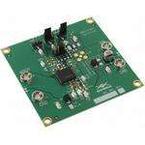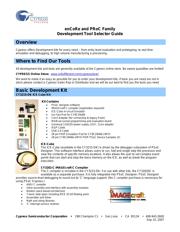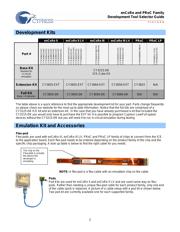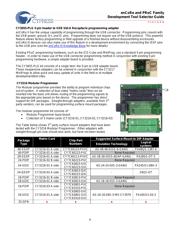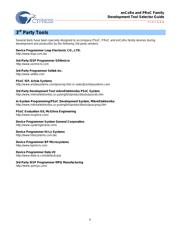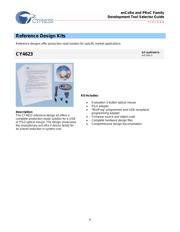下载

Cypress Semiconductor Corporation • 198 Champion Ct. • San Jose • CA 95134 • 408-943-2600
Sep 10, 2007
enCoRe and PRoC Family
Development Tool Selector Guide
Overview
Cypress offers Development kits for every need – from entry level evaluation and prototyping, to real time
emulation and debugging, to high volume manufacturing a processing.
Where to Find Our Tools
All development kits and tools are generally available at the Cypress online store. Be aware quantities are limited!
CYPRESS Online Store: www.onfulfillment.com/cypressstore/
We want to make it as easy as possible for you to order your development kits, if tools you are need are not in
stock please contact a Cypress Sales Rep or Distributor and we will do our best to find you the tools you need
Basic Development Kit
CY3215-DK ICE Cube Kit
Kit Contains
• PSoC designer software
• iMAGEcraft C compiler (registration required)
• ICE Cube In-circuit Emulator
• Ice Flex-Pod for CY8C29x66
• Cat-5 Adapter (for connecting to legacy Pods)
• MiniEval socket programming and evaluation board
• Universal 110/220 power supply (12V) , Euro adapter
• ISSP Cable
• USB 2.0 Cable
• 28 pin PDIP Emulation Pod for CY8C29466-24PXI
• 28 pin CY8C29466-24PXI PDIP PSoC Device Samples (2)
ICE-Cube
The ICE-Cube (available in the CY3215-DK) is driven by the debugger subsystem of PSoC
Designer. This software interface allows users to run, halt and single step the processor and
view the contents of specific memory locations. It also allows the user to set complex event
points that can start and stop the trace memory on the ICE, as well as break the program
execution.
CY3202-C iMAGEcraft C Compiler
The C compiler is included in the CY3215-DK. For use with other kits, the CY32020C is
available as a separate purchase. It is fully integrated into PSoC Designer. PSoC Designer
provides source-level debugging to round out its ‘C’ language support. (No C compiler purchase is necessary for
using PSoC Express.)
• ANSI C compiler
• Inline assembly and interface with assembly modules
• Modern stack-based architecture
• 7 basic data types including IEEE 32-bit floating point
• Assembler and linker
• Math and string libraries
• ‘C’ interrupt service routines

